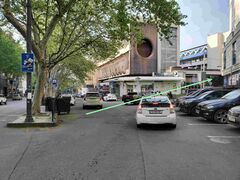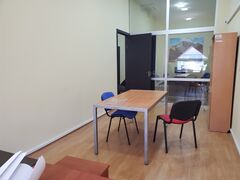
Istituto cultura italiana NCLE link
| Name | Istituto cultura italiana NCLE |
|---|---|
| Logo | 
|
| Type | Non profit organization |
| Country | Georgia |
| City | Tbilisi |
| Address | Kostava st. 47 |
| Coordinates | 41° 42' 34.68" N, 44° 47' 7.47" E |
| Foundation year | 2015 |
| ici.tbilisi@culturaitaliana.org | |
| Website | https://istitutoculturaitaliana.org/ |
Abstract[edit | edit source]
Istituto cultura italiana (NGO) is a non-profit organization operating in the linguistic and literary field, active in Tbilisi (Georgia). It has two complementary aims, that is promotion of Italian culture and language in Georgia, with an inclusive and democratic orientation, and of Georgian culture at international level and through its activities.
From the beginning of its activities the organization has combined its cultural offer with an information processing work, with a strong emphasis on media literacy and the conscious use of new technologies.
Location & Venue[edit | edit source]
The Institute is located in M. Kostava st. 47, besides the Technical Library. Here are the coordinates on the map.
Our office is open every day Monday-Friday from 16.00/16.30 to 20.00 |
III floor, office 27
CILS certificate[edit | edit source]
Since 2022 we entered into an agreement with University for Foreigners of Siena for the provision of CILS certificates of Italian language.
With the official CILS certificate students can:
- comply with the requirements to obtain a residence card permit in Italy (required level, A2)
- comply with the requirements to obtain scholarships offered by the Italian Ministry of Foreign Affairs (they require a B1 level)
- comply with the requirements to obtain an Italian citizenship (B1 cittadinanza)
- enroll to a University course in Italy (required level, B2)
The current price for classes is 300 GEL / month. (2 lessons per week). The fee for individual lessons is 300 GEL / month (1 lesson per week) or 500 GEL / month 2 lessons per week.
Online degree course ICoN[edit | edit source]
The degree course in Italian language and culture for foreigners is a three-year course delivered online by the ICoN Consortium on behalf of member Italian universities. It has been active since 2001 and the awarded title is an Italian degree in all respects.
Enrollment opens every year in July (for the September semester) and in February (for the March semester)
European voluntary service - European solidarity corps[edit | edit source]
Since 2016 Istituto cultura italiana joined the European voluntary service programme (EVS, following ESC) hosting European young people in Georgia since 2018 in order to foster intercultural-exchange, contributing to the renovation of democratic, educational, social and civil structures in Georgia, and to involve young people in activities useful both for the local community, and for their personal and professional growth.
During several projects, we have been leading an editorial board with volunteers for digital publishing, we have been organizing a language club and intercultural exchange involving the local community, organized workshops and lectures at other organizations and institutions, and carried out a daily work on media-literacy and the conscious use of new technologies.
Gallery[edit | edit source]
Articles[edit | edit source]
- Borders and frontiers, the past, the present and the future: comparative history and international relations between Italy and Georgia (Article authors: Mattia Baldoni)
- Gloria Maritan - South Caucasian Women Photography-Panel (Article authors: Gloria Maritan)
- Incontro con Irakli Avalishvili di Luca Speziale (Article authors: Luca Speziale)
- Leisure time of some staff members (Article authors: Tommaso de Vivo)
- Meeting with Irakli Avalishvili (Article authors: Mattia Baldoni, Gabriele Rota, Tommaso de Vivo)
- Meeting with Irakli Avalishvili by Gabriele Rota (Article authors: Gabriele Rota)
- Meeting with Lasha Kharazi (Article authors: Mattia Baldoni, Gabriele Rota, Tommaso de Vivo)
- Meeting with Paramjeet Berwal (Article authors: Tommaso de Vivo, Gabriele Rota, Mattia Baldoni)
- Meeting with mr. Francisco Capote Yeregui (Article authors: Mattia Baldoni)
- Perché dovresti fare l’esperienza dell’ESC (Article authors: Luca Speziale)
- Presentazione del programma ESC all'Università della Georgia (Article authors: Sofia Camaglia)
- Recensione articolo "Analysing the shadows: private tutoring as a descriptor of the Education System in Georgia" (Article authors: Mattia Baldoni)
Posts[edit | edit source]
This section contains posts disseminated through social networks along the time. We don't advocate the use of social networks, therefore they are quite rare, although they reach the aim to not being too attractive, for educational (non-commercial) purposes.
- September 2016 - Cinque Terre!
- September 2016 - a present from Chianti (Florence)
- September 2016 - პოპულარული იტალიური გამონათქვამები
- November 2016 - Federigo Tozzi
- November 2016 - Minor classics
- November 2016 - მასწავლებლების რეზიუმეები
- November 2016 - ფედერიგო ტოცცის ბიოგრაფია
- December 2016 - იტალიური კულტურა
- December 2016 - Invito
- December 2016 - Sei italiano o italiana e vivi a Tbilisi?
- December 2016 - გილოცავთ დამდეგ შობა–ახალ წელს
- February 2017 - ფრანგული ენის მასწავლებლები
- December 2018 - Capodanno/1
- December 2018 - Presepe/2
- 1 - შობის სცენა
- December 2018 - Capodanno/2
- December 2018 - Presepe/3
- 2
- December 2018 - Capodanno/3
- December 2018 - ახალი წელი ყოველთვის პირველ იანვარს აღინიშნებოდა?
- 3
- December 2018 - Presepe/1
- December 2018 - ახალი წლის კონცეფციები, ინტელექტუალების და ხელოვანების მხრიდან
- January 2019 - ლუჩიო დალასი (Lucio Dalla)
- January 2019 - შობას გილოცავთ!!!
- 1
- April 2021 - კალაბრიის უნივერსიტეტის სასწავლო სტიპენდია
Language courses[edit | edit source]
The Institute of Italian culture (NGO) provides courses of Italian language in its classrooms located in M. Kostava st. 68, (at public Georgian Broadcaster, III building, II floor), right besides Heroes square.
Courses are being held in an informal and stimulating atmosphere, with classes composed by a small number of students, every day from 16.00 to 20.00 from Monday to Friday, and are aimed at intercultural exchange, inclusion, and solidarity.
If you are enthusiast of Italian language and culture, and you are interested to participate in an intercultural exchange with native Italian speakers (as well as Georgian qualified teachers and interpreters) in an environment distinguished by the right balance between professionalism, and a sympathetic and friendly atmosphere, just fill-in the following form (or directly write at ici.tbilisi@culturaitaliana.org) and we will get back to you as soon as possible.
Documents[edit | edit source]
Statute[edit | edit source]
CHARTER OF THE “INSTITUTE OF ITALIAN CULTURE”
A NON-PROFIT (CULTURAL) LEGAL ENTITY
established in Tbilisi, Georgia
The current Statute has been redacted according specifically to the Chapter 2 of the Georgian Civil code (“Legal persons”) and on the basis of to the “Entrepreneurs Law of Georgia”, specifically article 5.
2. Purposes of the organization (Object of activity)
3. Founder of the organization
4. Management of the organization
5. Reorganization of the current management (management of the “governing body”)
7. Liquidation⧸reorganization of the organization
Appendix 1. “Prerogatives” and guidelines of the organization
Appendix 2. A first product and literary example of this organization
Table of contents[edit | edit source]
Categories:









/CILS_certificate/1992357_1024x0r72_hc4732-768x302.jpg/300px-1992357_1024x0r72_hc4732-768x302.jpg)
/Language_courses/1-02-2017_2.jpg/300px-1-02-2017_2.jpg)
/CILS_certificate/Conversation-club.jpeg/240px-Conversation-club.jpeg)
/CILS_certificate/foto-aula.jpg/320px-foto-aula.jpg)
/Gallery/20211108_162057.jpg/320px-20211108_162057.jpg)
/Gallery/20210701_202003.jpg/320px-20210701_202003.jpg)
/Gallery/20210427_170449.jpg/320px-20210427_170449.jpg)
/Gallery/IMG_20210413_161336.jpg/240px-IMG_20210413_161336.jpg)
/Gallery/20210521_182815.jpg/320px-20210521_182815.jpg)
/Gallery/IMG_20210401_175224.jpg/240px-IMG_20210401_175224.jpg)
/Language_courses/Federica's_lessons/IMG_20210325_174910.jpg/240px-IMG_20210325_174910.jpg)
/Language_courses/Federica's_lessons/IMG_20210325_174318.jpg/240px-IMG_20210325_174318.jpg)
/Gallery/Contenuto_lavagna.jpg/240px-Contenuto_lavagna.jpg)
/Gallery/Claudia_Palazzo_at_lesson.jpg/240px-Claudia_Palazzo_at_lesson.jpg)
/Gallery/Tinatin_Tsagareishvili%2C_Mattia_Baldoni%2C_Gabriele_Rota.jpg/320px-Tinatin_Tsagareishvili%2C_Mattia_Baldoni%2C_Gabriele_Rota.jpg)
/Gallery/Francisco_Capote_Yeregui%2C_Mattia_Baldoni%2C_Gabriele_Rota.jpg/320px-Francisco_Capote_Yeregui%2C_Mattia_Baldoni%2C_Gabriele_Rota.jpg)
/Gallery/Office_on_the_IV_floor.jpg/320px-Office_on_the_IV_floor.jpg)
/Gallery/Claudia_Palazzo%2C_Maya_...%2C_Guantsa.jpg/135px-Claudia_Palazzo%2C_Maya_...%2C_Guantsa.jpg)
/Language_courses/20160510_161806_thumb.jpg/300px-20160510_161806_thumb.jpg)
/Documents/Istituto_cultura_italiana_%28NGO%29_-_brochure_2017.pdf/page1-300px-Istituto_cultura_italiana_%28NGO%29_-_brochure_2017.pdf.jpg)
/Documents/Statute_-_site_-_en_edited.pdf/page1-300px-Statute_-_site_-_en_edited.pdf.jpg)
/Documents/certificate-participation-sample.pdf/page1-300px-certificate-participation-sample.pdf.jpg)